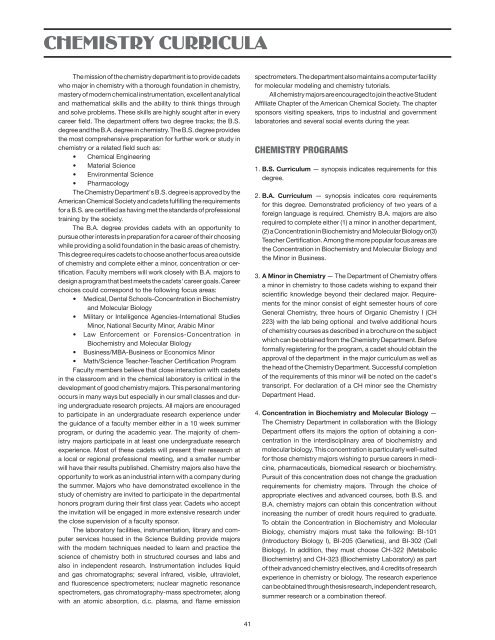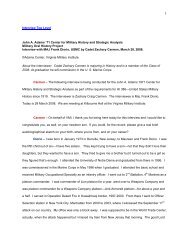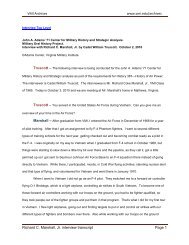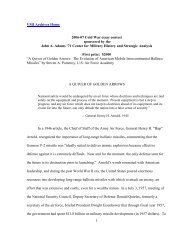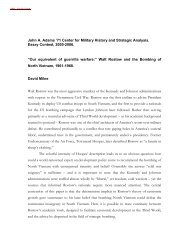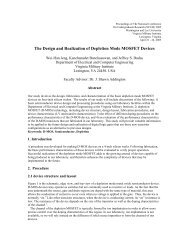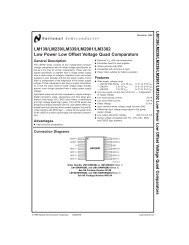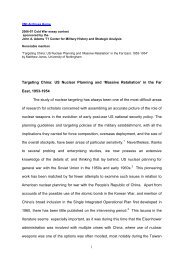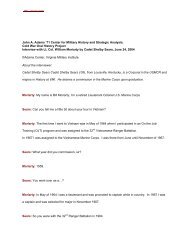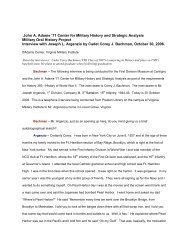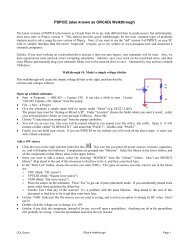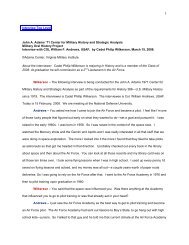Academic Catalog - Virginia Military Institute Admissions
Academic Catalog - Virginia Military Institute Admissions
Academic Catalog - Virginia Military Institute Admissions
You also want an ePaper? Increase the reach of your titles
YUMPU automatically turns print PDFs into web optimized ePapers that Google loves.
CHEMISTRY CURRICULA<br />
The mission of the chemistry department is to provide cadets<br />
who major in chemistry with a thorough foundation in chemistry,<br />
mastery of modern chemical instrumentation, excellent analytical<br />
and mathematical skills and the ability to think things through<br />
and solve problems. These skills are highly sought after in every<br />
career field. The department offers two degree tracks; the B.S.<br />
degree and the B.A. degree in chemistry. The B.S. degree provides<br />
the most comprehensive preparation for further work or study in<br />
chemistry or a related field such as:<br />
• Chemical Engineering<br />
• Material Science<br />
• Environmental Science<br />
• Pharmacology<br />
The Chemistry Department's B.S. degree is approved by the<br />
American Chemical Society and cadets fulfilling the requirements<br />
for a B.S. are certified as having met the standards of professional<br />
training by the society.<br />
The B.A. degree provides cadets with an opportunity to<br />
pursue other interests in preparation for a career of their choosing<br />
while providing a solid foundation in the basic areas of chemistry.<br />
This degree requires cadets to choose another focus area outside<br />
of chemistry and complete either a minor, concentration or certification.<br />
Faculty members will work closely with B.A. majors to<br />
design a program that best meets the cadets' career goals. Career<br />
choices could correspond to the following focus areas:<br />
• Medical, Dental Schools-Concentration in Biochemistry<br />
and Molecular Biology<br />
• <strong>Military</strong> or Intelligence Agencies-International Studies<br />
Minor, National Security Minor, Arabic Minor<br />
• Law Enforcement or Forensics-Concentration in<br />
Biochemistry and Molecular Biology<br />
• Business/MBA-Business or Economics Minor<br />
• Math/Science Teacher-Teacher Certification Program<br />
Faculty members believe that close interaction with cadets<br />
in the classroom and in the chemical laboratory is critical in the<br />
development of good chemistry majors. This personal mentoring<br />
occurs in many ways but especially in our small classes and during<br />
undergraduate research projects. All majors are encouraged<br />
to participate in an undergraduate research experience under<br />
the guidance of a faculty member either in a 10 week summer<br />
program, or during the academic year. The majority of chemistry<br />
majors participate in at least one undergraduate research<br />
experience. Most of these cadets will present their research at<br />
a local or regional professional meeting, and a smaller number<br />
will have their results published. Chemistry majors also have the<br />
opportunity to work as an industrial intern with a company during<br />
the summer. Majors who have demonstrated excellence in the<br />
study of chemistry are invited to participate in the departmental<br />
honors program during their first class year. Cadets who accept<br />
the invitation will be engaged in more extensive research under<br />
the close supervision of a faculty sponsor.<br />
The laboratory facilities, instrumentation, library and computer<br />
services housed in the Science Building provide majors<br />
with the modern techniques needed to learn and practice the<br />
science of chemistry both in structured courses and labs and<br />
also in independent research. Instrumentation includes liquid<br />
and gas chromatographs; several infrared, visible, ultraviolet,<br />
and fluorescence spectrometers; nuclear magnetic resonance<br />
spectrometers, gas chromatography-mass spectrometer, along<br />
with an atomic absorption, d.c. plasma, and flame emission<br />
spectrometers. The department also maintains a computer facility<br />
for molecular modeling and chemistry tutorials.<br />
All chemistry majors are encouraged to join the active Student<br />
Affiliate Chapter of the American Chemical Society. The chapter<br />
sponsors visiting speakers, trips to industrial and government<br />
laboratories and several social events during the year.<br />
CHEMISTRY PROGRAMS<br />
1. B.S. Curriculum — synopsis indicates requirements for this<br />
degree.<br />
2. B.A. Curriculum — synopsis indicates core requirements<br />
for this degree. Demonstrated proficiency of two years of a<br />
foreign language is required. Chemistry B.A. majors are also<br />
required to complete either (1) a minor in another department,<br />
(2) a Concentration in Biochemistry and Molecular Biology or(3)<br />
Teacher Certification. Among the more popular focus areas are<br />
the Concentration in Biochemistry and Molecular Biology and<br />
the Minor in Business.<br />
3. A Minor in Chemistry — The Department of Chemistry offers<br />
a minor in chemistry to those cadets wishing to expand their<br />
scientific knowledge beyond their declared major. Requirements<br />
for the minor consist of eight semester hours of core<br />
General Chemistry, three hours of Organic Chemistry I (CH<br />
223) with the lab being optional and twelve additional hours<br />
of chemistry courses as described in a brochure on the subject<br />
which can be obtained from the Chemistry Department. Before<br />
formally registering for the program, a cadet should obtain the<br />
approval of the department in the major curriculum as well as<br />
the head of the Chemistry Department. Successful completion<br />
of the requirements of this minor will be noted on the cadet's<br />
transcript. For declaration of a CH minor see the Chemistry<br />
Department Head.<br />
4. Concentration in Biochemistry and Molecular Biology —<br />
The Chemistry Department in collaboration with the Biology<br />
Department offers its majors the option of obtaining a concentration<br />
in the interdisciplinary area of biochemistry and<br />
molecular biology. This concentration is particularly well-suited<br />
for those chemistry majors wishing to pursue careers in medicine,<br />
pharmaceuticals, biomedical research or biochemistry.<br />
Pursuit of this concentration does not change the graduation<br />
requirements for chemistry majors. Through the choice of<br />
appropriate electives and advanced courses, both B.S. and<br />
B.A. chemistry majors can obtain this concentration without<br />
increasing the number of credit hours required to graduate.<br />
To obtain the Concentration in Biochemistry and Molecular<br />
Biology, chemistry majors must take the following: BI-101<br />
(Introductory Biology I), BI-205 (Genetics), and BI-302 (Cell<br />
Biology). In addition, they must choose CH-322 (Metabolic<br />
Biochemistry) and CH-323 (Biochemistry Laboratory) as part<br />
of their advanced chemistry electives, and 4 credits of research<br />
experience in chemistry or biology. The research experience<br />
can be obtained through thesis research, independent research,<br />
summer research or a combination thereof.<br />
41


